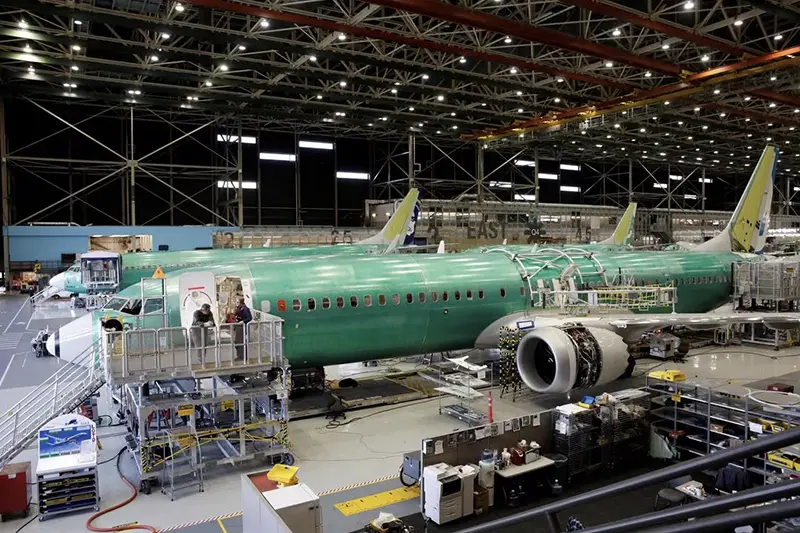January 25, 2024 – 9:37 AM PST

(Reuters) – Boeing’s (BA.N) troubles with its best-selling 737 MAX jets are upending the aerospace industry’s 2024 plans, changing airlines’ fleet and expansion goals as U.S. regulators ramp up scrutiny of the planes.
Analysts warn more pain for carriers after the FAA late Wednesday froze increases in production of the single-aisle 737 MAX.
The FAA said the order meant Boeing could continue producing MAX jets at the current monthly rate, but it could not increase that rate. It offered no estimate of how long the limitation would last and did not specify the number of planes Boeing can produce each month.
Customers’ frustration is mounting.
“Boeing needs to get their act together,” said American Airlines (AAL.O) CEO Robert Isom, calling the issues “unacceptable.”
“It is hard enough running an airline. We need quality product, and that’s what we demand.”
The FAA’s unprecedented intervention in production schedules could further delay some deliveries of new planes to airlines and hurt suppliers already reeling from an earlier MAX crisis and the pandemic.
Boeing CEO Dave Calhoun told Reuters on Thursday he supported the FAA decision. “We all want safe airplanes. This is a safe airplane,” he said.
Texas-based American has 20 MAX planes on order for deliveries this year. Chief Financial Officer Devon May told Reuters that the FAA’s order may have a “modest” impact on those deliveries.
American is looking to place a new order for planes for deliveries in 2027 and beyond. May said the company is talking to Boeing, Airbus (AIR.PA) and Embraer (EMBR3.SA) for the new order, but is mindful of Boeing’s ongoing issues.
“We absolutely take current events into consideration as we’re going through our analysis of this order,” May said in an interview.
Alaska Air Group (ALK.N), the operator of the single-aisle 737 MAX 9 that suffered a mid-air incident this month, on Thursday forecast a $150-million profit hit in 2024 from the more-than-two-week grounding of the aircraft.
The carrier also cast doubts on its capacity growth plans for the year, citing “the grounding, and the potential for future delivery delays.”
Alaska’s CEO Ben Minicucci on Thursday said Alaska remains “fully committed” to its relationship with Boeing, adding: “We’re going to hold Boeing’s feet to the fire to make sure that we get good airplanes out of that factory.”
Southwest Airlines (LUV.N) altered its fleet plans for 2024 due to Boeing’s continued supply-chain challenges and uncertainty over certification of the smaller MAX 7. Before the Jan. 5 accident when a cabin panel fell off during Alaska’s flight, Southwest was expecting the MAX 7 plane to get certification by this April.
Southwest expects non-fuel operating costs to be up as much as 7% in 2024, in part due to maintenance expenses. The delivery delays have forced airlines to fly older planes longer than expected, driving up maintenance and repair costs.
MORE PAIN FOR AIRLINES
Some airlines could be significantly impacted by any freeze on higher production, a senior industry source said, though many in the industry have already factored in some delays as aerospace firms continue to recover from the pandemic.
United Airlines (UAL.O), for example, has 100 MAX deliveries scheduled for this year, according to a regulatory filing in October. This week it warned of a wider-than-expected first-quarter loss due to the grounding of MAX 9 airplanes.
United’s CEO Scott Kirby said the company would also build a new fleet plan because of Boeing’s regulatory and delivery delays.
Boeing shares were down 6% Thursday. Supplier Spirit Aerosystems (SPR.N) fell 7%. Shares of Alaska were up 4%, Southwest’s fell 0.6%, United’s shares were trading up 3%, while American rose 9%.
The FAA did allow grounded MAX 9 planes to return to service once inspections were done, a relief to U.S. MAX 9 operators Alaska and United, which had been forced to cancel thousands of flights and aim to begin returning the planes to service on Friday and Sunday, respectively.
PRODUCTION LINE PLANS
Boeing is seeking to increase production of 737 MAX family to keep pace with demand and close a gap in the market with Airbus.
Analysts have expressed concerns that extra scrutiny of Boeing factories would temper production increases for the smaller and more widely sold MAX 8, a key source of cash for Boeing and many suppliers.
Boeing’s latest 737 master schedule, which sets the production pace for suppliers, calls for production to rise to between now and late 2025, Reuters reported in December. However, Boeing’s own production pace can lag the supplier master schedule.
The FAA’s decision could impact plans to stand up a new 737 MAX line in Everett, Washington, by mid-2024.
The line, set to be the fourth 737 line overall and the first outside its Renton plant in suburban Seattle, is needed to meet strong demand.
Boeing declined to comment on any potential impact on the Everett line.
Reporting by Rajesh Kumar Singh in Chicago, Abhijith Ganapavaram in Bengaluru, Valerie Insinna and David Shephardson in Washington, Lisa Barrington in Seoul and Tim Hepher in Paris; Additional reporting by Sophie Yu in Beijing and Mehr Bedi in Bengaluru; Editing by Jamie Freed, Raju Gopalakrishnan and Nick Zieminski

